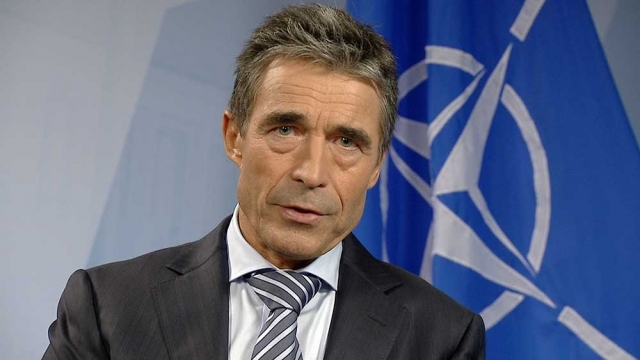Former NATO Chief Claims Putin Was Once a Pro-Western Politician
KYIV - Former NATO Secretary-General Anders Fogh Rasmussen claimed in an interview with independent Ukrainian broadcaster Hromadske that Russian President Vladimir Putin was a pro-Western politician when he first came to power in late 1999, but later soured on his relationship with the West.
“The first time we saw each other was in May 2002. At that time, he was a very pro-Western and pro-European president. I had met him under different circumstances in later years, and each time his attitude become increasingly negative. All this because of the color revolutions in Georgia and Ukraine. He was convinced that the revolutions were instigated and financed by the United States,” said Rassmusen.
Georgia’s 2003 Rose Revolution and Ukraine’s Orange Revolution in 2004 - known as the 'color revolutions' - attempted to overthrow the two countries' post-Soviet governments, which were widely seen as endemically corrupt and staunchly pro-Russian.
Georgia successfully toppled its president - former Soviet Foreign Minister Eduard Shevardnadze - after the ruling class attempted to rig the election in favor of Shevardnadze. Ukraine was initially successful in overturning its own bogus poll that saw the dictatorial Viktor Yanukovych win a comically rigged election. But the initial successes of the Orange Revolution soon broke down into a series of petty squabbles amongst the movement's leader and eventually led to Yanukovych returning to power.
Rasmussen was quick to point out that the West and Russia have common interests and can co-operate despite Putin’s personal opinion of the US or NATO military alliance.
“When Russia invaded Ukraine in 2014, we saw that Russia does not share any of our common values. Since then, I have completely changed my attitude and opinion of Putin. Despite this, however, I am convinced that we need to cooperate with each other instead of going down the road of confrontation,” said Rasmussen.
Rasmussen, who currently serves as a non-staff advisor to Ukrainian President Petro Poroshenko, has been one of Putin’s staunchest critics since his 2014 invasion of Ukraine’s Crimean Peninsula and the subsequent, ongoing war in the eastern Donbass region.
His claims that the autocratic Putin once harbored pro-Western sentiments fly in the face of conventional wisdom that says he was inherently anti-Western and fiercely opposed to the continued existence of NATO following the collapse of the Soviet Union.
Putin’s biography leaves little indication that he ever goodwill towards his former Cold War adversaries. As former lieutenant colonel in the Soviet Union’s infamous KGB, Putin has gone on record saying he openly opposed the Red Army’s withdrawal from Eastern Europe, the reunification of Germany – where he served in the KGB, and described the collapse of the Soviet Union as “the greatest geopolitical catastrophe of the 20th century.”
He’s frequently referred to former KGB chiefs Yury Andropov (who crushed the 1956 Hungarian Revolution and the 1968 Prague Spring) and Vladimir Kryuchkov (the mastermind behind the August 1991 Coup that attempted to topple Soviet President Mikhail Gorbachev) as two of his greatest mentors.
Putin has long been accused of embezzling funds from Western donations while serving as chief deputy to St. Petersburg Mayor Anatoly Sobchak in the 1990s. First came under fire more than 20 years ago when the city’s infrastructure was collapsing, while corruption and organized crime flourished.
Since effectively taking over as Russia’s head of state in late 1999, Putin has systemically destroyed the country’s civil society and rolled-back its modest attempts to liberalize its political system.
In the 17 years since first coming to power, the 63-year-old Putin has systematically destroyed Russia’s already weak independent judiciary, imprisoned or forced into exile his political opponents, launched a brutal war of re-conquest against the breakaway republic of Chechnya that set new standards for human rights abuses and silenced the once independent media in the process.
Putin went on to converted the State Duma into a rubber stamp legislative body, invaded Georgia and Ukraine, embraced a reactionary and nationalistic interpretation of what he deemed ‘traditional values’, which reject Western concepts of human rights, and reincarnated the state secret security services to the all-powerful position they once held during the Soviet Union.
By Natia Liparteliani
Edited by Nicholas Waller












